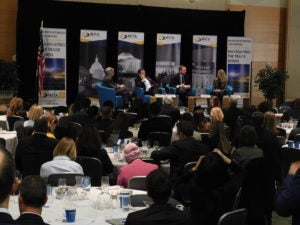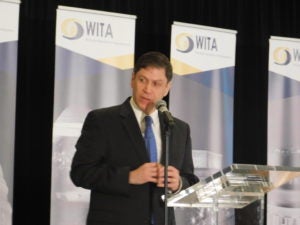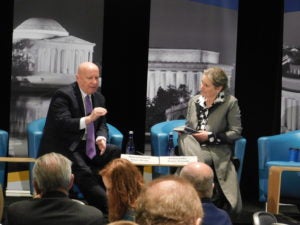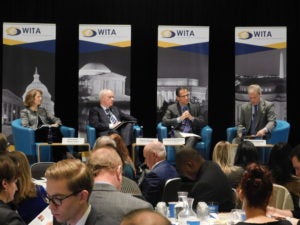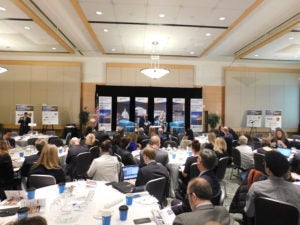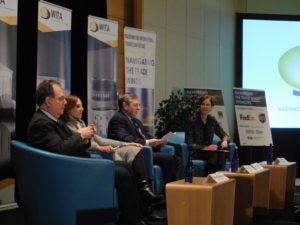On Tuesday, January 29, 2019, WITA hosted its first annual Washington International Trade Conference (WITC) in the Atrium Ballroom of the Ronald Reagan International Trade Building and International Trade Center. This day-long conference featured a variety of leaders and experts from both the private and public sectors to discuss issues in the international trade world.
The event began with introductory remarks from Andrew Gelfuso, Vice President of Trade Center Management Associates, Kenneth I. Levinson, Executive Director of WITA, and Laura Lane of UPS. Shortly thereafter, Rep. Kevin Brady, Ranking Member of the House Ways & Means Committee, and Susan Schwab, former USTR sat down for an Armchair Discussion focusing on a variety of topics, including USMCA, US-China negotiations, and the future US-EU trade relations.
Shortly thereafter, a panel discussion took place entitled “The Art of the Deal”, which opened discussion for questions, skepticism, and criticism of USMCA. The speakers that were featured in this panel include Kenneth Smith Ramos, former Mexican Chief Negotiator for the modernisation of NAFTA, Ambassador Miriam Sapiro, Managing Director at Sard Verbinnen & Co. (SVC), and the honourable Perrin Beatty, President of the Canadian Chamber of Commerce. Each speaker represented the three nations involved in the agreement. The moderator for this panel was Eric Farnsworth, Vice President for the Council for the Americas. The discussants talked about their views on the deal itself, its chances of becoming ratified, and the reactions of the respective private and public sector communities regarding the agreement.
After the conclusion of the USMCA discussion, the next panel, entitled “In a Trade War with China, What Does Victory Look Like?” commenced. Ambassador Darci Vetter, the Vice-Chair of Agriculture, Food, and Trade at Edelman was the moderator. David Dollar of Brookings, Bonnie Glaser of CSIS, and David Goldman of Asia Times, all contributed to a discussion that explored the possible outcomes, implications, and history of the U.S.- China trade war.
The first panel of the afternoon was called “Meet the Trade Press: Reporters Roundtable.” Many trade policy events feature reporters asking questions of trade policy experts and trade professionals, but this panel turned the tables. It featured a group of reporters who gave their thoughts on trade reporting and the place of trade in the news cycle. Featured panelists included Gina Chon, the Washington Columnist at Reuters Breakingviews, Shawn Donnan, a Senior Writer at Bloomberg News, and David Lynch, Global Economics Correspondent at the Washington Post. The moderator of this panel was Dorothy Dwoskin, the Principal of d2 Strategies LLC.
After the conclusion of the trade reporters panel, the next discussion to take place was “The Future of Trade — a NextGenTrade® Discussion of Technology, Trade Facilitation & Global Value Chains.” The panelists all had diverse backgrounds within the trade community, and they were each able to bring specialized expertise and a unique perspective on how trade would evolve in the near future. The panelists included Tim Bell, an Additive Manufacturing Business Manager at Siemens Digital Factory Division, Andy Brown, the Executive Director of Supply Chain Transformation at Ernst & Young, Ralph Carter, the Vice-President of International Regulatory Affairs at FedEx Express, and Melissa Nelson, Vice President and General Counsel at SanMar Corporation. The moderator of the panel was Stephen Lamar, the Executive Vice President of the American Apparel & Footwear Association.
Following the panel on the future of trade, the next panel was called “What do Global Investors Think About During a Trade War?” The discussants, who were comprised of Hampton Dowling, Managing Partner at the HCB Group, and Dr. Maria Vassalou, Partner at Perella Weinberg in the Asset Management Division, were joined by moderator Lionel C. Johnson, head of Pacific Pension and Investment Institute. During the robust discussion, which focused on the effect of trade disputes on global financial markets, the speakers talked about how changes in policy and politics can be reflected in market volatility and how it affects their firms and clients.
The penultimate panel of the day was called “Trade Politics in the Age of Trump.” The panelists discussed how political attitudes towards trade have changed with the Trump administration. The first panelist to speak was Bruce Stokes, the Director of Global Economic Attitudes at Pew Research Center, who gave a presentation regarding the electorate’s political attitude towards trade issues. This presentation was followed by commentary from the other featured panelists, Robert Moran, a Partner at Brunswick Insight, and JD Grom, the Executive Director of the New Democrat Coalition. The moderator of the discussion was Kimberly Ellis, a Partner at Monument Advocacy. Stokes’ presentation can be found here.
The final panel discussion to take place was entitled “Closing Plenary – Trade and American Values.” The discussion centered on how the founding fathers viewed free trade, and whether or not the current international trading regime is compatible with the values they set forth. Featured speakers included Thea Lee, the President of the Economic Policy Institute, Walter Russell Mead, Ravenel B. Curry III Distinguished Fellow in Strategy and Statesmanship at the Hudson Institute, and Michael Anton, Lecturer in Politics and Research Fellow at Hillsdale College’s Kirby Center. The moderator of the panel was Grant Aldonas, the Executive Director of the Institute of International Economic Law at Georgetown University.

